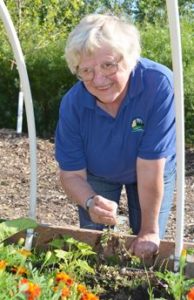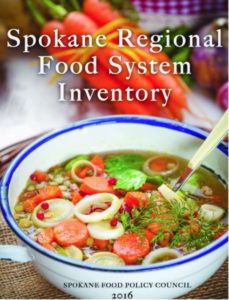By: Pat Munts
Small Farms and Urban Agriculture Coordinator
WSU Spokane County Extension

The men and women who grow our food are getting older. Who will replace them?
Who will step into a job that sends a person out into the heat, dust, rain, snow, cold and an uncertain market? Who will step into a job that requires long hours; knowledge of accounting, marketing, meteorology, chemistry, engineering, personnel management, plant genetics, animal health, entomology, soil science, mechanics and construction and food safety and environmental law? Who will step into a job that will involve your family in every decision you make, good, bad or indifferent; every disaster, equipment breakdown during harvest or early frost? Who will step into a job whose joys of being close to the Earth, doing what you love and giving back to the natural world and your community are immeasurable?
According to the most recent USDA Agricultural Census (2012), the average age of farmers in the US was 58.3, up from 57.1 in the 2007 Census. What will it be when the 2017 Census comes out later this year? The average age has been rising since 1982 when it was just above 50. Some estimates say we will need a million new farmers in the next ten years to replace existing farmers as they retire. Where will we get them?
Potential new farmers face many complex challenges to get into any form of agriculture be it a five-acre CSA farm or a 1,000+ cattle or grain farm. For starters, there is the lure of better paying jobs with reasonable hours available to younger people. Farming is hard mental and physical work that may not appeal to younger people when they have other more lucrative opportunities. The clear majority of small scale farmers in the US have to rely on off-farm income to support a family and provide insurance.
Secondly, buying good quality farmland is expensive and beginning farmers may not have the credit to get the loans they need to buy the land and the startup equipment to get their enterprise off the ground. Farmland is often valued at its development value which when figured into the farm’s cost of production makes farming unprofitable from the get-go. In the case of our region’s large-scale grain and cattle operations, there is no way for a younger farmer to get into commodity farming unless they inherit the farm or work out a succession plan with a retiring farmer, both of which are not very common.
Going to school to learn about farming is fine but the true learning takes place in the field when the weather goes south on a crop or marketing decisions don’t pan out like you’d hoped. In the past, nuts and bolts farming skills were passed down from older to younger farmers over a broken-down tractor or breakfast at the local coffee shop or at the sale yard. Those relationships are now few and far between especially for the smaller scale farmers. The Spokane Valley and Deer Park area were once full of experienced farmers who knew every soil type and quirky microclimate and how to manage them. Without that cadre of historical knowledge, each new farmer must reinvent the wheel which can get expensive.
Lastly, consumers have forgotten how to buy locally grown crops, fruit, meat and eggs. It’s very easy to run to the big box grocery store and buy everything you need (or now buy it online and have it delivered). We have gotten used to eating food that was bred more for appearance on a shelf or to survive a 1,500-mile trip from the field instead of seeking out the sweetest local carrot, fully ripened peach or eggs that were laid the day before. We have forgotten how to buy seasonally when different crops are at their peak in the local region. We no longer preserve the surpluses of fruit and vegetables that are in season to enjoy in the dead of winter. We have become addicted to being able to buy cheap food without taking into consideration to its actual impact on our lives now and into the future.
There is no step-by-step fail-safe process we can pull out of the hat to correct this. There are no laws we can pass that will create an easy path to find new farmers. There is no monetary tool a banker can pull out that makes farming affordable. If we are to encourage new farmers, we, as consumers, citizens and legislators must recognize the need to support the next generation of food producers. We must begin a conversation about how to do this as individuals and as community. Buying Local Builds Local
On an individual level, we can look at our buying habits. Start looking for locally sourced produce and fruit which is now showing up in our markets. Ask the produce managers where they source their offerings. Enough people asking will make them find the answers even at the big- box grocers. Sign up for a subscription to a Community Supported Agriculture program with a local farmer. Each week you will receive a box of fresh vegetables from your farmer. Pull together groups at work or church to join the CSA. Visit local farmers’ markets or go to Green Bluff.
As a community, we need to acknowledge that even the smallest part-time farms growing food and animals are an important part of our economic infrastructure. They buy from local suppliers just like any other business. They help diversify our economy. Each pound of vegetables, fruit, meat or milk they sell equals four servings at a meal. How important is it to have a local food system if some crisis interrupts our global food chain?
Because land access is a major barrier for new farmers, we need to talk to our policy makers about finding ways to preserve high quality farm land from development. What kind of market based mechanisms can we implement that would allow for development but preserve working lands for agriculture? Do we change land use designations? Do we create conservation easements that allow for working lands? Do we create a credit system that rewards developers for preserving agricultural land?
The challenges are many and they will take time, energy and commitment to overcome. To start, each of us engage with our local farm economy to raise awareness of how important the act of growing food is to this community. Diverting your dollars and acquiring knowledge as eaters and community members will go a long way toward raising a larger, stronger voice that will lead to the kind of community support that will open doors for the brave souls who want to farm.


